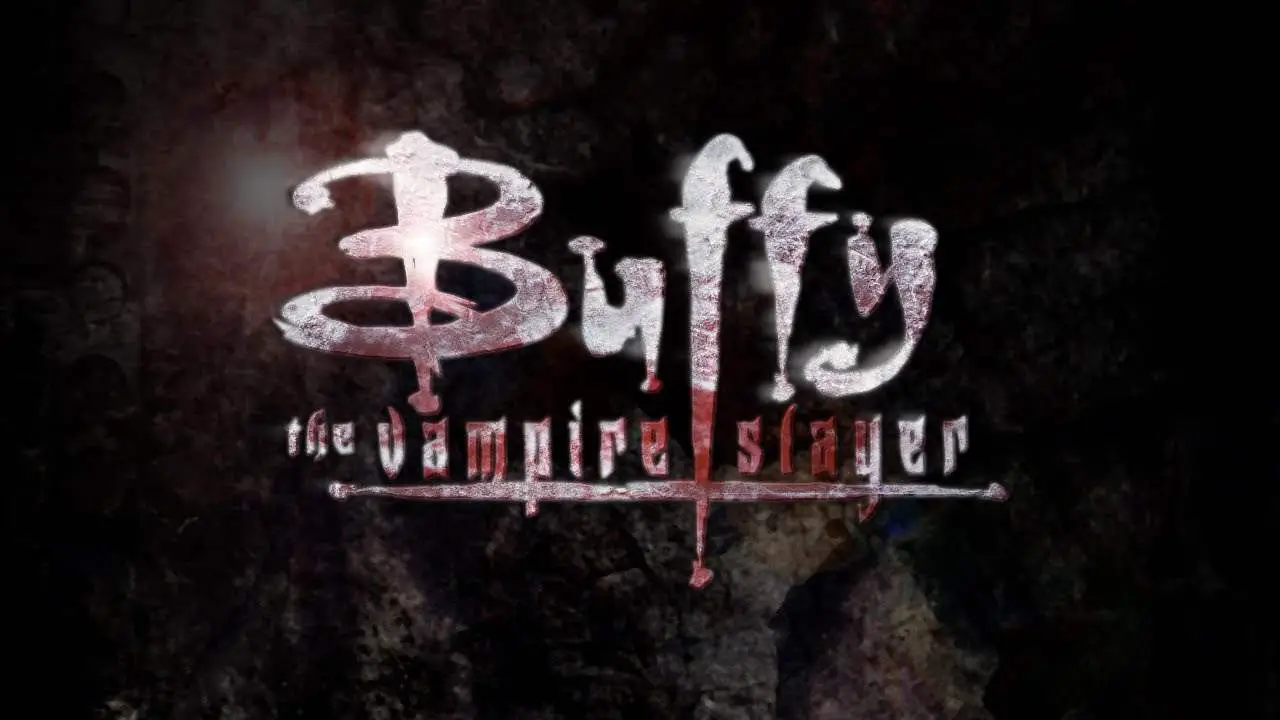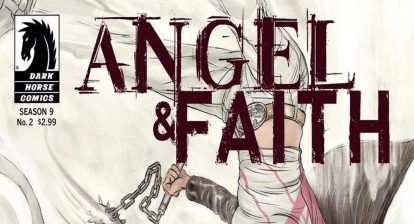For seven years, Buffy the Vampire Slayer gave us amazing television week after week. I was immediately drawn to the series because of my love of the 1992 film, yet what I got with the show was something much more involved and engaging than simply a quirky teen comedy with vampires. It was a show that I obsessed over and studied, and one I often quoted and referenced in real life, to people who mostly didn’t get it.
Twenty years later, Buffy is still a show that people talk about with the high reverence. Its themes and message are still relevant today. Though I know them all by heart, there are times when I feel the need to watch certain episodes based on my mood. And while I could talk endlessly about all 144 episodes, I thought it would be fun to pick out the best episode of each season. I realize that “best” is subjective in this case. The episodes I have chosen to highlight for each season are either uniquely different from all the others, or have important messages to share. So if you want to celebrate twenty years of witty banter and fighting demons, maybe give one of these episodes a look.
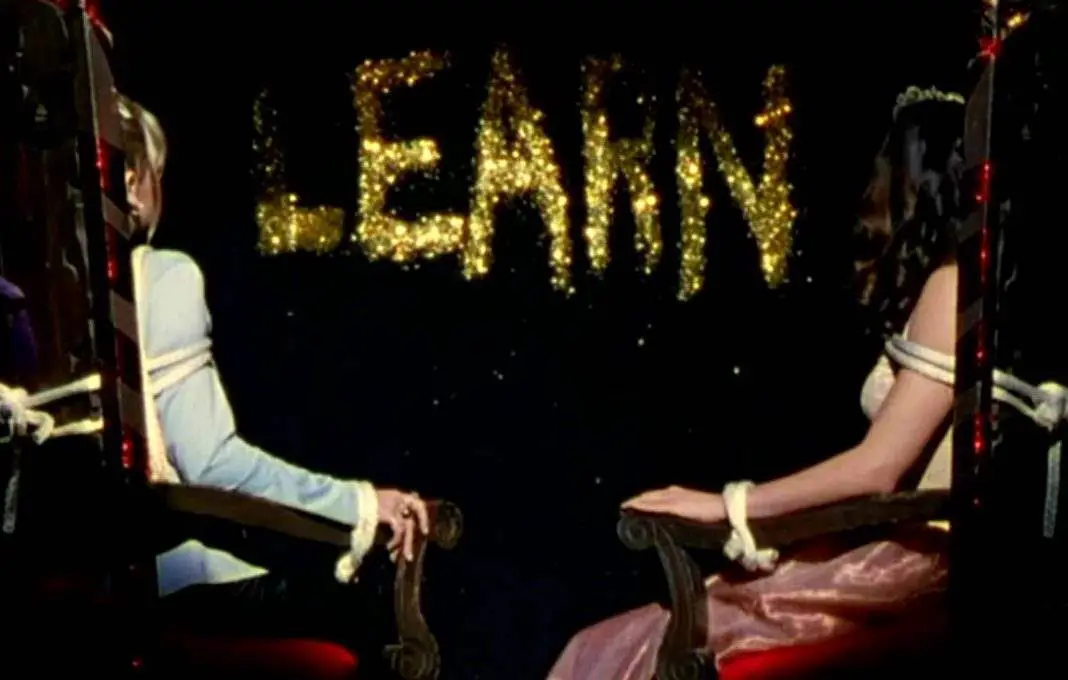
Season 1: “Out of Mind, Out of Sight”
Many of the early episodes of Buffy focus on the struggles of being in high school. The desire for popularity, or even basic acceptance, within a sometimes brutal class system is a theme that comes up time and again. One of the saddest explorations of this occurs in the season one episode “Out of Mind, Out of Sight.” Marcie Ross (played by the wonderful Clea Duvall) is presented as a simply unremarkable girl who is constantly ignored by her fellow classmates and even her teachers. Add in the mystical powers that surround the Hellmouth, and you get a girl who feels invisible actually turning invisible. She then uses that power to exact revenge against those she feels are responsible for making her that way, specifically Cordelia.
In these scenes, Marcie can be heard laughing as she commits the crimes. This, and her crazed ranting later on, evokes parallels to H.G. Wells’ The Invisible Man. Marcie becomes drunk with power, and enjoys taking out her revenge; but she also starts to have less and less concern for the well-being of other people, and eventually delves into insanity. The clues she leaves at her crime scenes include the words “look,” “listen,” and “learn.” This can be seen both as a warning and a lesson about the affects that ostracization can have on a person.
“Out of Mind, Out of Sight” is also an important episode for its brief, yet poignant, point that it makes for the other side of the issue. Cordelia tells Buffy that she understands Marcie’s loneliness. This may seem like crocodile tears coming from the most popular girl in school, but she makes a convincing argument. She brings up the fakeness that can exist within cliques, and that the people she considers her friends might not even like her, and only hang out with her because of her social status. Cordelia accepts this for her own sanity, because “it beats being alone all by yourself.”

Season 2: “Becoming, Part 2”
Season two is when Buffy really grew up as a show, and tackled some of the most dramatic plot lines they had attempted to date. It all culminates in the season finale “Becoming, Part 2,” which could actually be the most important episode of the show, because it is when Buffy learns what it truly means to be the Slayer.
The mysterious Whistler asks Buffy in an early scene, “What are you prepared to give up?” As Buffy gets closer to her showdown with Angelus to stop him from awakening the demon Acathla and destroying the world, she loses one thing after another. She has already lost Angel, but when her mother Joyce learns of Buffy’s secret identity, she can’t handle it right away and kicks her out of the house. This is most likely something said in the heat of the moment, but Buffy takes it as a loss. Principal Snyder expels her. Willow’s spell to restore Angel’s soul works at the last minute, but Buffy has to kill him anyway.
The hard truth that Buffy learns is that being a Slayer is about sacrifice. She must be prepared to give up everything, and be strong enough to carry the burden that comes with that. Though she ends the episode a very broken human being, making this sacrifice does greatly strengthen her character. It aids her in becoming the kind of Slayer who will not only continue to save the world as the show goes on, but also change the world, making even bigger sacrifices along the way, including her own life.
The life of a vampire slayer is always described as a brutal and lonely one. However, the thing that makes Buffy different from the other slayers is her friends. The Scooby Gang have created their own makeshift family unit, and in “Becoming, Part 2,” their bond is fully formed. The gravity of their lives comes crashing down on them, as members of their group have been hurt, kidnapped, and even killed. This is where they realize how important they truly are to one another. Even if she feels like she has lost everything, Buffy’s friends won’t let her fight alone. This support system is ultimately what makes Buffy one of the most successful and longest-lasting Slayers.
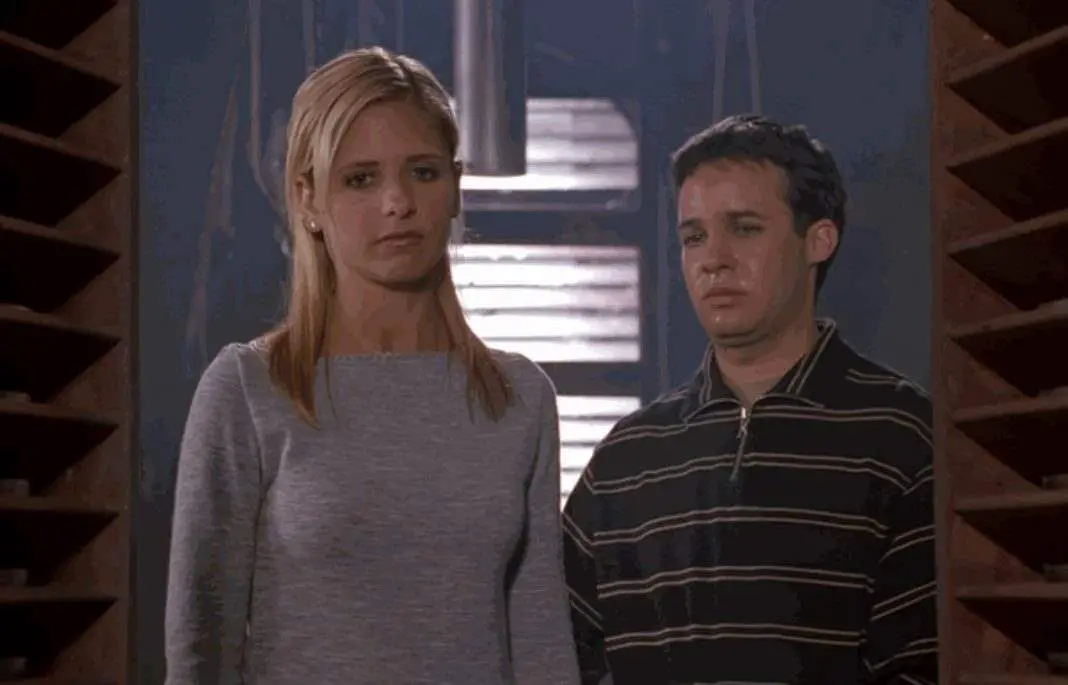
Season 3: “Earshot”
In the last of Buffy’s high school years, we get the episode “Earshot.” Buffy is given the ability to read minds after coming in contact with the blood of a telepathic demon. She hears a voice that threatens everyone at school, and the Scoobies must find the person by lunchtime the next day. This episode also has a very important message about the tribulations of high school, but it is one we almost didn’t get to hear. The Columbine school shooting occurred just one week before the episode’s original air date, and its premiere was delayed five months because it depicted a kid bringing a gun to school.
But this wasn’t the intention behind “Earshot” at all. Buffy at first thinks her new power is fun, and could give her a better advantages as the Slayer (and in English class). However, as she continues to hear the innermost thoughts of her classmates, she realizes just how much pain everybody experiences on a daily basis, without showing it on the outside. She hears their insecurities about their bodies and social status, and about their fears of failure and rejection.
The gang assumes that the threat to kill everyone involves a mass shooting, and Buffy thinks she’s stopped it when she confronts lonely Jonathan in the school clock tower with a rifle. He feels ignored, misunderstood, and unimportant. The speech Buffy gives Jonathan is somewhat harsh, but something he needs to hear. The whole point of the episode can be summed up in her one line to him–“Every single person down there is ignoring your pain because they’re too busy with their own.” Jonathan is not as alone as he thinks because no one is alone in their pain. This should be something that brings us all together, but, especially in high school, outward appearances matter, and that’s where trouble can happen.
Of course, Jonathan never intended to kill anyone but himself in that clock tower. The real killer turns out to be a crazy lunch lady armed with rat poison, which is just another example of the brilliant and hilarious twists that Buffy can make on seemingly familiar situations.
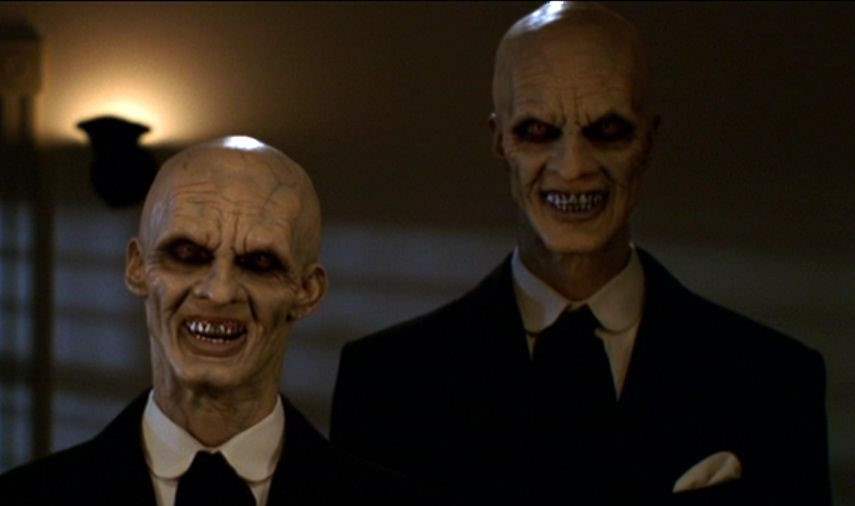
Season 4: “Hush”
“Hush” is easily one of the most popular and well-known episodes of Buffy, and in the overall fractured feeling of season four, it definitely stands out as the best. A group of demons called The Gentlemen arrive in Sunnydale and steal the voices from the town, so that their victims cannot scream when they are having their hearts cut out. For a show known for its clever and witty dialogue, Joss Whedon wrote this episode as a challenge, and greatly succeeded. The mostly silent episode was ironically nominated for an Emmy Award for Outstanding Writing in a Drama Series.
The episode is obviously about communication. Buffy and Riley both have secrets. Xander can’t express his true feelings about Anya. Willow’s Wiccan group is all talk and no show. In a surprise turn of events, the lack of language to hide behind causes everyone to communicate their feelings better. Their gestures and other attempts at communication is where much of the episode’s humor comes from, but one has to admire the writing and acting here because of how easily the point comes across, relying only on visuals. The episode also shows how easily things can break down among people when they don’t know how to communicate properly.
In addition to this, “Hush” is well-known, even to non-Buffy fans, because The Gentlemen are some of the creepiest villains in the Buffyverse. The two main Gentlemen are played with amazing skill by Doug Jones and Camden Toy. The skeletal yet distinguished look of these monsters is only enhanced by the fluidity of the actors’ movements and expressions.
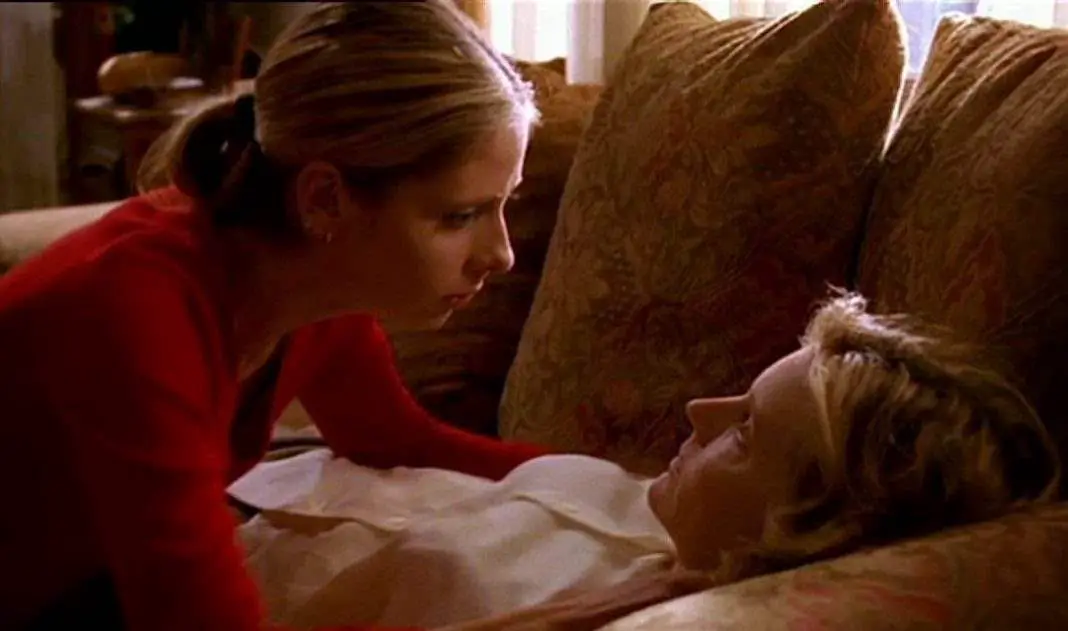
Season 5: “The Body”
In a show that constantly dealt with death, it was never felt more than in season five’s “The Body.” Buffy and Dawn’s mother, Joyce, dies suddenly from a brain aneurysm, and the episode follows them in the aftermath. But a part of what makes “The Body” so special and different is that it deals with the immediate aftermath of death–the paramedics, the difficult phone calls and conversations, the trip to the hospital morgue.
As a bottle episode, “The Body” is devastating because of how mundane the scenes are. There is no music, and barely any action. None of the characters, least of all Buffy, ever seem to know what to do or say, and Dawn can’t even believe that her mother is really dead. The awkwardness in some of these scenes feels more real than anything seen on Buffy before because it is real—when someone so close to you dies, how do you make it through the next minute?
Whedon shot “The Body” in a much different style than other episodes to further enhance the characters’ feelings. In the sequence where Buffy first finds Joyce’s body, he uses handheld camerawork to get the audience in the moment with her. The long and unusual cuts to things like the number buttons on a telephone, or the drawing that Dawn is working on in class, capture those times when you focus on the strangest of things because you just don’t know what to think or do in a traumatic situation. The harsh cuts to Joyce’s open-eyed, lifeless face punctuate the harshness of reality. There are several scenes that still make me cry every time I watch this episode because the moments are captured so beautifully and with so much emotion.
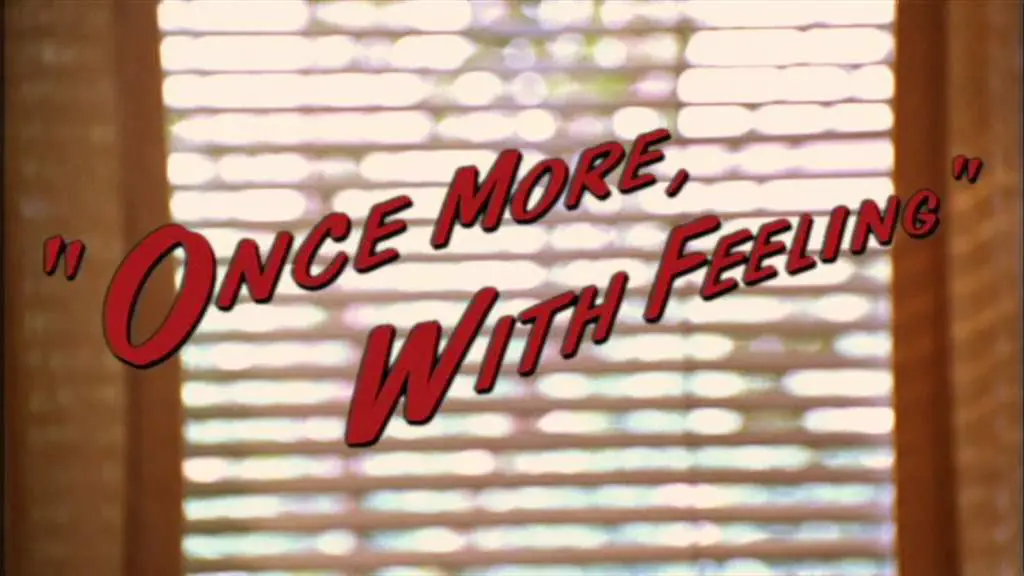
Season 6: “Once More, With Feeling”
Buffy’s sixth season went down some very dark roads. The bright, shining light in all this misery is “Once More, With Feeling,” the token musical episode that also happens to be really good. Joss Whedon wrote all the lyrics and music himself, and the cast spent weeks rehearsing choreography and recording all their songs. This is the longest episode, and was also shot in widescreen.
But “Once More, With Feeling” is not entirely without misery. Xander summons a demon called Sweet that brings about all the musical shenanigans, and not all the songs are of a joyous, uplifting variety. The characters sing about what is really in their hearts and minds, things they are otherwise not able to express to the others—how unsure Xander and Anya feel about their relationship, Buffy’s torment about being torn out of heaven, Spike and Buffy’s blossoming relationship. This is the episode where, for better or worse, everything comes out in the open, and becomes something with which everyone has to deal for the rest of the season.
It takes a bit of bravery on the part of the cast to put out a musical episode, and most people were probably surprised at some of the innate talent of these people. We had seen Anthony Stewart Head sing before in previous episodes, and James Marsters already looks like he’s in a rock band, but who knew that Amber Benson had such a beautiful, breathy voice? Or that Emma Caulfield was so light on her feet? “Once More, With Feeling” is not only a success in its concept and execution, but was also a brilliant and unique way to further several storylines going on in the show.
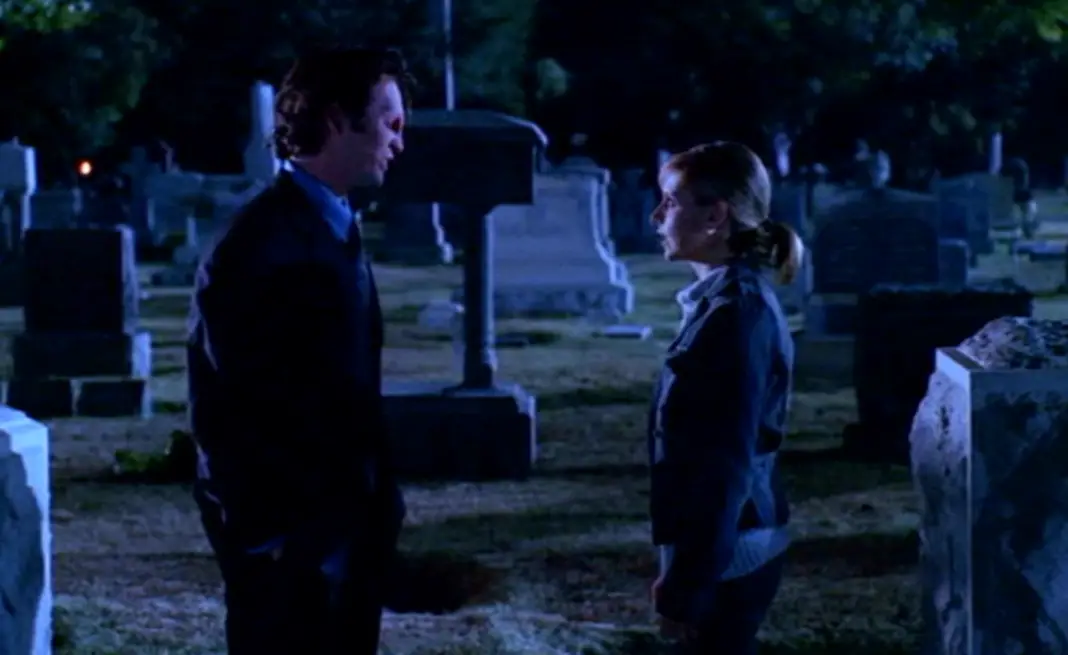
Season 7: “Conversations with Dead People”
“Conversations with Dead People” is a unique episode because of its structure. Over the course of one night, Buffy, Willow, Dawn, and Andrew and Jonathan all have different experiences of being visited by dead people or ghosts. For some of them, this is their first encounter with The First Evil, the biggest Big Bad of them all, who tricks them into thinking they are talking to someone they know. The four different parts of this episode were also written by four different writers, giving each one their own unique feel.
The episode opens with a haunting song called “Blue” performed by Angie Hart. The last word of the song is “alone,” referencing the fact that each character has to deal with their dead person alone. They all handle it different ways: Andrew lets The First talk him into an unspeakable act; Willow at first falls for its tricks but ultimately sees through them; Dawn becomes desperate at the possibility of being able to speak to her mother again; and Buffy takes the opportunity to talk about her feelings with someone outside her inner circle. The First proves itself to be a most dangerous foe because of how convincing it can be, and how much it already knows about the characters.
The guest stars can often shine above the main cast on Buffy, and this episode is no exception. Azura Skye reprises her role as Cassie, acting equal parts sweet and creepy. Joss Whedon favorite Jonathan M. Woodward, who also appeared on Angel and Firefly, gives a ridiculously charming performance the vampire Holden who ends up having a psychoanalysis session with Buffy. Dawn also shows how much stronger a character she has become, as she handles herself in a way that would make Buffy very proud in such a terrifying situation.
